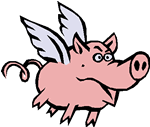Flying pigs
 If you think something is very unlikely to happen you might make references to flying pigs to signal your disbelief. Or you might talk about plummeting temperatures in hell. That will happen when pigs fly / when pigs have wings / when hell freezes over, you might say.
If you think something is very unlikely to happen you might make references to flying pigs to signal your disbelief. Or you might talk about plummeting temperatures in hell. That will happen when pigs fly / when pigs have wings / when hell freezes over, you might say.
Flying pigs are also thought highly unlikely in Norwegian – når griser flyr (when pigs fly), Swedish – när grisar flyger (when pigs fly), German – wenn Schweine fliegen können (when pigs can fly) or wenn Schweine Flügel hätten, wäre alles möglich (if pigs had wings, everything would be possible), and Welsh – pan fydd moch yn hedfan (when pigs fly).
The possibility of cows flying is considered unlikely in Finnish – sitten kun lehmät lentävät (when cows fly) or jos lehmällä olisi siivet, se lentäisi (if cow had wings, it would fly), and also in Catalan – quan les vaques volin (when cows fly).
In Spanish flying cows are also rare – cuando las vacas vuelen (when cows fly), as are hairy frogs – cuando las ranas crien pelo (when frogs grow hair).
Flying donkeys are what you have to watch out for in Italy – quando voleranno gli asini (when donkeys will fly).
The idea of hens growing teeth is thought to be unlikely in French – quand les poules auront des dents (when hens have teeth), as is the idea of cows with wings – quand les vaches auront des ailes (when cows have wings).
In Russian the most unlikely event is thought to be whistling crayfish – Когда рак на горе свистнет (When the crayfish on the hill whistles).
